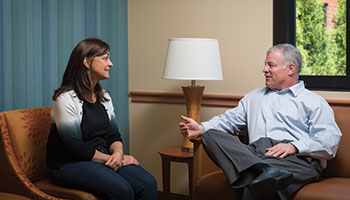
Rogers Behavioral Health is a national leader in the use of cognitive behavioral therapy (CBT), a widely accepted treatment approach for people with obsessive compulsive disorder (OCD) and anxiety. As the foundation of our treatment programs, studies show that CBT delivered in a highly structured, yet managed approach, empowers our patients to gain control over their symptoms and learn effective strategies they can use throughout their lives.
While CBT has been successfully used for a number of years in the treatment of OCD and anxiety disorders, its use at Rogers has now been extended. The Herrington Recovery Center, our addiction residential program, now includes a dual diagnosis track to simultaneously treat OCD, OC-spectrum and anxiety disorders with substance use disorders. Research shows that for persons with co-occurring disorders, the most successful recovery is achieved when their conditions are addressed concurrently. At least fourteen hours per week of CBT, directed by two program dedicated behavioral specialists, has been added to the daily schedule. This allows for effective treatment of alcohol or other drug addiction as well as the psychiatric disorder, resulting in a more attainable, long-term successful recovery.
While the dual diagnosis program addresses both OCD and addiction concerns, the daily schedule also includes traditional elements of addiction treatment. For example, patients in the dual program continue to follow the twelve-step model, complete homework assignments, meet regularly with a sponsor and receive treatment with an emphasis on AA to overcome addiction.


